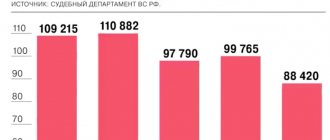Fines for violations of labor safety rules
What are the penalties for violations?
Previously, liability for violation of labor laws, as well as labor protection, was regulated by Art. 5.27 Code of Administrative Offences. Moreover, the amount of the imposed fine did not exceed 50,000 rubles.
To date, non-compliance with the stipulated requirements is established in separate articles of the Code of Administrative Offences. Each of them identifies individual offenses that, in the opinion of the legislator, are serious. Responsibility for them has become more strict. For example, a separate category consists of violations regarding incorrect drafting of employment contracts. In 2021, the maximum liability is 100,000 rubles.
The innovations are a kind of signal to employers who do not comply with the law that special authorities will monitor the work of each enterprise more carefully.
The wording of violations of OT rules was previously general. Accordingly, inspectors applied sanctions for all existing violations in the aggregate during the inspection process. After changes in legislation and the identification of different types of violations, fines will be assessed for each of them separately, cumulatively.
Material liability
The employer must take care in advance to include a provision on financial liability in the text of the employment contract, or sign an additional agreement with the employee. After an employee learns that he is financially responsible within the framework of his position, if damage is caused to the organization, he will be obliged to compensate it.
Conditions for bringing employees to financial liability
In order for an employer to be able to hold an employee financially liable, the employee must be an adult and the following conditions must be met:
- the employee’s actions must be unlawful;
- there must be guilt in the actions (or inactions);
- There must be a causal connection between consequences and actions.
The employee is responsible only for the amount of his monthly earnings. The exception is cases when, through his fault, the employer paid certain amounts to the injured persons - in such a situation, the employee, in addition to direct damage, also compensates for these payments. According to Article 247 of the Labor Code of the Russian Federation, the employee is obliged to compensate for material losses if his guilt is proven by the employer and such damage can be calculated. At the same time, according to Article 238 of the Labor Code of the Russian Federation, the employer’s lost profits are not taken into account. It should be noted that, according to Article 240 of the Labor Code of the Russian Federation, the employer may completely or partially refuse to receive compensation for damage from the guilty party.
Increase in fines
The amount of administrative fines has been significantly increased. Previously, their maximum amount per official was 5,000 rubles, but in 2021 it can reach up to 40,000 rubles. For legal entities, these figures increased from 50,000 to 200,000 thousand rubles.
The greatest increase was observed in sanctions for violation of labor safety standards. The maximum fine can be 80,000 rubles. For individual violations, this amount will reach 130,000 rubles.
These include, for example, sending workers to perform direct duties without proper medical examination and knowledge of labor protection rules.
Of course, the presented rule of law is formulated in such a way that each violation is a separate offense in relation to a specific employee. If previously an enterprise in which a large number of workers were not trained in labor safety rules paid a fine of 50,000 rubles, now they are required to pay the established amount of the fine for each employee separately.
Also, a warning has appeared in the legislation, which represents a new administrative penalty.
At first glance, it is more profitable for entrepreneurs, since it does not require payment of a fine, but a prerequisite for the introduction of this punishment is the publication of information about identified violations in the media.
Repeated violation of the requirements established by law when concluding an employment contract or repeated violation when concluding a civil contract instead of an employment contract is punishable by disqualification of officials for a period of one to three years. That is, in this case, administrative fines will not be introduced, and the law provides for more stringent penalties.
Where to complain about management actions
If labor safety rules are violated by an employee, this is the responsibility of the employer, who must ensure their compliance. If safety standards are regularly violated at an enterprise through no fault of the employee, then subordinates often cannot fight this state of affairs and are forced to either accept it or quit. The most common safety violations committed by responsible persons:
- ignoring the rules on fencing structures and other protective devices, especially at construction sites;
- permission to work without the necessary protective equipment (helmets, suits, masks) or the use of uncertified products;
- provision of outdated equipment that does not meet requirements or faulty equipment;
- lack of training and timely safety instructions;
- lack of necessary medical examinations;
- non-compliance with the rest regime, as a result of which overworked workers make mistakes.
However, the employee can defend his rights to safe work. For this purpose, there are several authorities that monitor compliance with labor law standards. If the employer does not ensure compliance with safety regulations, his actions can be appealed:
- To the State Labor Inspectorate (SIT). This organization is a supervisory body with broad powers to control labor relations.
- To the prosecutor's office . If the actions of management, as a result of violation of labor protection, have resulted or may result in danger to the life and health of people, this is a criminal offense, which the prosecutor's office is authorized to suppress. If, through the fault of management, a crime has occurred that the employee knows about, this must be reported to the police (for example, an accident at work or construction was hidden).
- To court. If a labor dispute or other conflict between an employer and a subordinate is associated with a violation of safety regulations, the employee can always go to court to protect his rights (for example, to seek compensation due to an occupational disease).
Note. There are situations when the director of an organization is not aware of violations occurring within departments (especially in large companies). Therefore, before writing to the supervisory authorities, it is worth writing a complaint addressed to the first person, describing the situation in it and referring to the violated norms of the law. In this case, it is better to indicate that if no measures are taken, the applicant will be forced to contact the authorized bodies. The complaint is drawn up in free form, and it is better to send it through the office, officially registering your appeal.
Increasing the statute of limitations
An important change was also the increase in the statute of limitations for bringing administrative liability from two months to one year. For example, if an enterprise violated the requirements established by the legislator, a legal entity or individual could solve this problem before the scheduled inspection. Employers could not be held administratively or otherwise liable if all detected inconsistencies were not found again more than two months before the inspection, since the statute of limitations had expired. Today it is impossible to avoid responsibility. This is not possible even if violations are corrected immediately upon discovery. Employers need to check compliance with all labor and safety laws. If violations are detected, they must be corrected immediately, which will reduce the risk of prosecution.
Civil liability
Civil liability is one of the types of legal liability, which represents the legal consequences established by the rules of law of non-fulfillment or improper fulfillment by a person (legal or physical) of the duties provided for by law, which is associated with a violation of the subjective rights of another person (employee).
The civil liability of legal entities - employers (organizations) is provided for by legislative and regulatory acts, the Labor Code of the Russian Federation, the Civil Code (Civil Code) of the Russian Federation and special acts.
Financial liability for harm caused to health is also provided for in civil legal relations and is regulated by Chapter 59 of the Civil Code of the Russian Federation. If a citizen is injured or otherwise damaged his health, the victim’s lost earnings (income) that he had or could definitely have, as well as additional expenses incurred due to damage to health, including expenses for treatment, additional food, and the purchase of medicines, are subject to compensation. , prosthetics, outside care, sanatorium and resort treatment, purchase of special vehicles, preparation for another profession, if it is established that the victim needs these types of help and care and does not have the right to receive them free of charge.
Penalty table
| Violation | Responsibility | Article of the Administrative Code |
| The organization, its officials or entrepreneur violated labor protection requirements , except for the cases provided for in Parts 2–4 of Art. 5.27.1 Code of Administrative Offenses of the Russian Federation | For officials - a warning or a fine from 2000 to 5000 rubles . For entrepreneurs – a fine from 2000 to 5000 rubles. For organizations - a fine from 50,000 to 80,000 rubles. | Part 1 Art. 5.27.1 Code of Administrative Offenses of the Russian Federation |
| The organization, its officials or the entrepreneur violated the established procedure for conducting a special assessment of working conditions in the workplace or did not conduct it at all | For officials - a warning or a fine from 5,000 to 10,000 rubles. For entrepreneurs - a fine from 5,000 to 10,000 rubles. For organizations - a fine of 60,000 to 80,000 rubles. | Part 2 Art. 5.27.1 Code of Administrative Offenses of the Russian Federation |
| The organization, its officials or the entrepreneur allowed the employee to perform labor duties in the presence of medical contraindications or without undergoing in the prescribed manner: training and testing knowledge of labor protection requirements ; mandatory medical examinations (preliminary, periodic, daily); mandatory psychiatric examinations | For officials - a fine from 15,000 to 25,000 rubles. For entrepreneurs - a fine of 15,000 to 25,000 rubles. For organizations - a fine from 110,000 to 130,000 rubles. | Part 3 Art. 5.27.1 Code of Administrative Offenses of the Russian Federation |
| The organization, its officials or entrepreneur did not provide workers with personal protective equipment | For officials - a fine of 20,000 to 30,000 rubles. For entrepreneurs - a fine of 20,000 to 30,000 rubles. For organizations - a fine of 130,000 to 150,000 rubles. | Part 4 Art. 5.27.1 Code of Administrative Offenses of the Russian Federation |
| The organization, its officials or the entrepreneur repeatedly violated labor protection requirements . Previously, the violator had already been brought to justice for a similar violation under the relevant part of Art. 5.27.1 Code of Administrative Offenses of the Russian Federation | For officials - a fine of 30,000 to 40,000 rubles. or disqualification for a period of one to three years. For entrepreneurs - a fine of 30,000 to 40,000 rubles. or suspension of activities for up to 90 days. For organizations – a fine from 100,000 to 200,000 rubles. or suspension of activities for up to 90 days | Part 5 Art. 5.27.1 Code of Administrative Offenses of the Russian Federation |
To the prosecutor's office
This body is authorized to monitor compliance with the legislation of the Russian Federation and carry out a supervisory function. If failure to comply with safety regulations has led or may lead to serious harm to health or death, which is a criminal offense, the prosecutor's office conducts an inspection of the company's activities.
The applicant contacts the prosecutor's office at the applicant's place of residence (address and contact numbers can be found on the Internet). The complaint is drawn up according to general rules; there is no special form provided for it. The document must include the following information:
- Full name of the prosecutor or the name and address of the prosecutor's office;
- Full name of the applicant, registration address;
- information about the organization, director;
- description of the situation;
- handling a resolution (holding the official and organization accountable);
- date, signature, list of attachments (it is advisable to provide materials proving violations, or refer to witnesses who can confirm this).
The prosecutor's office does not consider anonymous complaints. You can send your appeal by registered mail, or you can send your appeal online. To do this, you need to go to the Internet reception of the prosecutor's office in your region.
We recommend reading: How to write a complaint to the Prosecutor's Office
The legislative framework
When appealing a safety violation by an employer, the following regulations must be followed:
- “Labor Code of the Russian Federation” dated December 30, 2001 N 197-FZ.
- “Civil Procedure Code of the Russian Federation” dated November 14, 2002 No. 138-FZ.
- “Criminal Code of the Russian Federation” dated June 13, 1996 N 63-FZ;
- Federal Law “On the procedure for considering appeals from citizens of the Russian Federation” dated May 2, 2006 N 59-FZ;
- Federal Law “On the Prosecutor's Office of the Russian Federation” dated January 17, 1992 N 2202-1.
To court
To protect violated rights, a citizen has the right to go to court, including in parallel with appeals to the labor inspectorate or the prosecutor’s office. By concluding an employment contract, the employer assumes obligations to ensure safe work. Violations of the conditions of labor interaction can be addressed to the court if the consequences did not cause serious harm to human health - in this case, this is criminal jurisdiction.
In addition to the restoration of violated rights, claims can include compensation for moral damage or harm to health (for example, the occurrence of occupational diseases). If proceedings with management led to suspension or dismissal, you can also apply for reinstatement and payment of wages (Article 236 of the Labor Code of the Russian Federation).
You should apply to a court of general jurisdiction at the location of the organization, but you can also apply at the place of residence of the employee or at the location of the company’s branch (clause 6.3, clause 9 of Article 29 of the Code of Civil Procedure of the Russian Federation).
Statement of claim
The claim is drawn up in accordance with the provisions of Art. 131 Code of Civil Procedure of the Russian Federation, the following information is indicated:
- name and address of the court;
- applicant details;
- details of the defendant (name and address of the organization);
- the plaintiff’s demands (I ask: compensation for the damage caused, reinstatement at work...)
- circumstances, arguments about the illegality of actions with reference to the law;
- list of applications;
- date and signature.
Important: state fees are not charged in cases of restoration of labor rights (Article 393 of the Labor Code of the Russian Federation).
you can here




